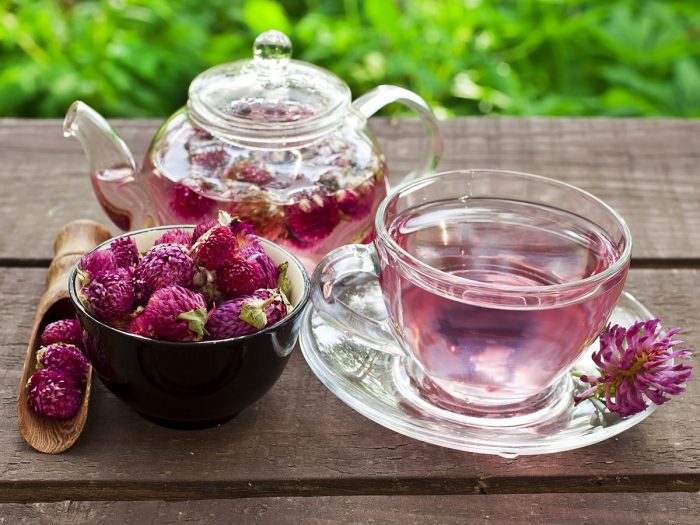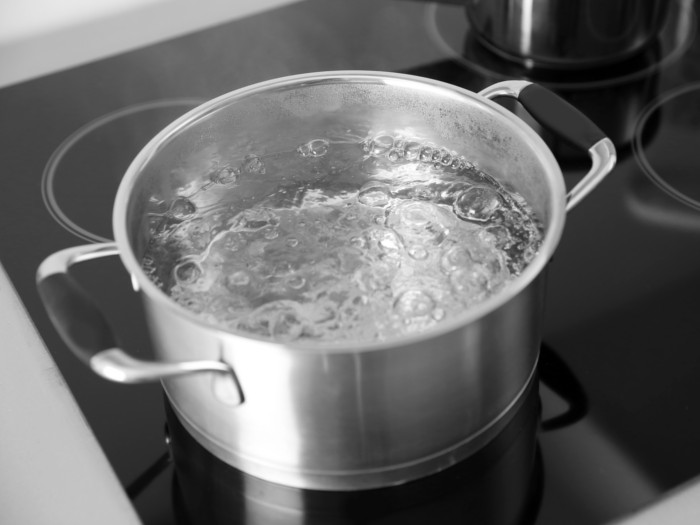The top benefits of red clover tea include its ability to lower cholesterol, mitigate the effects of menopause, protect against prostate cancer, improve circulation, soothe the nerves, increase bone density, treat respiratory infections, cleanse the skin, detoxify the body and strengthen the immune system. Due to the presence of estrogen-like compounds in this tea, there are some side effects, particularly for people who have been diagnosed with hormone-dependent conditions, such as breast cancer or endometriosis. According to Cancer Research UK researchers, Dr. Ruth C Travis and Dr. Timothy J Key, estrogen exposure is a major determinant of risk for breast cancer. Allergic reactions and other side effects related to blood disorders and pregnancy must also be considered. [1]
What is Red Clover Tea?
Red clover tea is made from the flowers and leaves of the red clover plant, which is taxonomically known as Trifolium pratense. This herb can be found across Asia, Europe and North America, and has been widely praised for its medicinal value by indigenous people and natural health practitioners. Many of the health benefits attributed to this herbal tea are due to the presence of isoflavones (estrogen-like compounds) in this plant in addition to vitamins and minerals, such as vitamin C, calcium, potassium, phosphorous and magnesium.
Benefits of Red Clover Tea
Drinking red clover tea is highly recommended for people who are suffering from hormonal fluctuation, cold, cough, congestion, weak immunity, osteoporosis, anxiety, stress, depression, anemia, eczema, psoriasis, painful menstruation, high cholesterol, menopausal symptoms and high toxicity, as well as people at high risk of breast and prostate cancer.
Anticancer Potential

Freshly brewed red clover tea Photo Credit: Shutterstock
A number of studies have linked the antioxidants and isoflavones found in red clover tea to anti-cancer and anti-mutagenic effects, specifically in the prevention of prostate cancer. However, given that isoflavones resemble estrogen in their effects, these same compounds can make certain cancers worse, or increase the risk of developing them, including breast cancer and ovarian cancer. This dual effect of these potent chemicals means that this tea should be consumed with caution, and only after speaking with a doctor. [2]
Eases Menstruation
Menopause can be a very stressful time in a woman’s life, as the body changes too much in such a short period of time, and can suffer from hot flashes, headaches, anxiety, mood swings, insomnia and even heart palpitations. Many studies have shown that the isoflavones found in red clover tea can mitigate many of these symptoms and ease the transition. By mimicking the effect of estrogen in the body, these chemicals can also ease the pain of certain menstrual symptoms such as cramps and heavy bleeding. [3]
Skin Care
The anti-inflammatory property of this tea, in addition to its range of minerals and immune-boosting nutrients can help eliminate conditions like eczema, psoriasis and other irritated areas of your skin, while also stimulating the growth of new cells. [4]
Hair Care
Traditional use of this herb often relates to hair loss treatment, and people brew the tea, allow it to cool, and then apply it to their scalp and strands of hair. This can help drive nutrients into the scalp, including antioxidants that can prevent hair loss from the follicles, and promote a healthy shine to the hair. [5]
Improves Bone Density
One of the biggest risks as people age is the loss of bone mineral density, particularly when women go through menopause. The estrogen-like effects of the active compounds in red clover tea help to strengthen bones, while the rich blend of minerals in the tea protects against osteoporosis. [6]
Protects Heart Health
Research has shown that red clover tea actively lowers the level of LDL cholesterol in the body, which can often lead to atherosclerosis, heart attacks and strokes, in addition to cardiovascular disease. This tea also helps reduce strain on the heart thanks to its blood-thinning properties, making blood clots far less likely. [7]
Boosts Immune System
This tea has a notable amount of vitamin C, which can stimulate the immune system and act as an antioxidant, seeking out free radicals and preventing oxidative stress in tissues and organ systems. This ascorbic acid is also integral to the production of collagen and helps to speed healing and regrowth throughout the body. [8]
Detoxifies the Body
Red clover tea has mild diuretic properties, meaning that it stimulates urination, which helps to rid the body of excess fats, salts, toxins and water, relieving the strain and workload in the liver and kidneys. [9]
Increases Circulation
The blood-thinning properties of this tea make it excellent for circulation, while the calcium content helps to improve iron uptake during digestion. Both of these factors mean more oxygenated blood will reach the body’s extremities, skin and organ systems, meaning better function, faster repair and quicker regrowth of healthy new cells. [10]
How to Make Red Clover Tea?
You can easily make this tea at home. Due to the widespread presence of these flowering “weeds”, many people choose to harvest the red clover blossoms in the wild and dry them at home. If you aren’t interested in harvesting them in the wild, you can get these from many herbalists and natural health stores.
To harvest red clover blossoms yourself, pluck off the flowering heads (not all of them from a single plant or patch), and collect them in a basket. It is best to pick them 1-2 weeks after the first bloom. Place them on a drying rack or in a dry, warm, dark and well-ventilated place for 1-2 weeks. You should turn the blossoms every few days and they should not be touching one another. Once they are completely dry, you are ready to brew your tea!
Anyway, let us go through the step by step process of making red clover tea at home.

How To Make Red Clover Tea: Easy Recipe
Ingredients
- 3 tsp dried red clover blossoms
- 2 cups water filtered
Instructions
- To make red clover tea, bring the water to a boil in a stainless steel pot.

- Add the blossoms to the pot and turn the heat down to a simmer.
- Allow the mixture to steep for 10-15 minutes.
- Strain the mixture and enjoy!

Side Effects of Red Clover Tea
Red clover tea can have a number of side effects, the most serious of which are due to the high concentration of isoflavones in the tea. These estrogen-like compounds can provide many different benefits, but also increase the risk of certain chronic diseases. Other considerations for pregnant women and those taking various medications should also be noted. [11]
- Hormone-Dependent Disease – A study published in the PLOS- One Journal by a team of Canadian researchers, suggests that the estrogen-like effects of the isoflavones found in red clover can exacerbate conditions like breast cancer, endometriosis, ovarian cancer or uterine cancer. Before adding a powerful herbal remedy like this to your daily or weekly regimen, speak to your doctor or an oncologist. [12]
- Surgery – Red clover tea is able to slow or prevent blood clotting, which is dangerous if you are undergoing surgery, or have a history of bleeding disorders. Also, if you are already taking anti-coagulant medications like warfarin, this additional blood-thinning effect can be dangerous if you are injured in some way, and can often lead to easy bruising.
- Pregnancy – Using this tea is not recommended in pregnant or breastfeeding women, due to the phytoestrogenic compounds and the effect it can have on uterine contractions and hormonal levels. Young children should also not be given this tea as a natural remedy.
- Birth Control – Some interactions have been reported by those women who take oral contraceptives, so if you are on birth control, speak to your doctor before making red clover tea a part of your natural health strategy.

